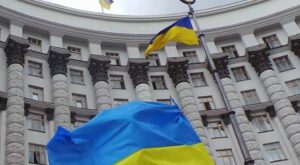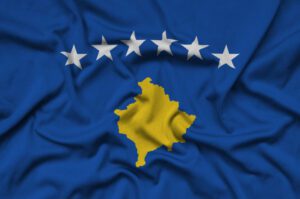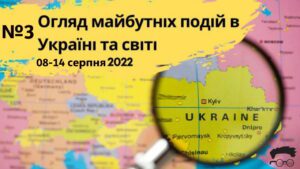
American actress Jessica Chastain arrived in Kyiv on Sunday, where she visited the Okhmatdet children’s hospital, Suspilnoye reports, citing its own correspondents.
It is noted that in addition to a visit to the hospital, Chastain also plans to travel to Irpen, as well as meet with President of Ukraine Volodymyr Zelensky and head of the President’s Office Andriy Yermak.
Jessica Chastain is an American actress and producer. Known for roles in the TV series “Dark Shadows”, the films “Interstellar”, “The Martian”, “Crimson Peak”, “People Isk: Dark Phoenix”, “Eyes of Tammy Fay” and others. She has already spoken publicly in support of Ukraine in connection with the invasion RF.
In 2012, the actress was included in Time magazine’s annual list of the 100 most influential people of the year. Chastain won an Oscar in 2022 for her performance as Tammy Faye in The Eyes of Tammy Faye.

The Cabinet of Ministers of Ukraine has approved a draft presidential decree on the confiscation of 903 objects that belong to the Russian state, Prime Minister Denys Shmygal said.
“As promised, we are taking Russian assets for the benefit of Ukraine and the Ukrainian people. We are doing this systematically in accordance with all procedures. We do not replace the law with our desire, but we are implementing this strategic task in a legal way. The confiscated assets are converted into funds used for our defense and restoration,” Shmyhal said at a government meeting on Friday.
According to the prime minister, the government has decided to confiscate Russian property and assets in Ukraine. In particular, a draft presidential decree was approved, which proposes the confiscation of 903 objects that belong to the Russian state.
According to Shmyhal, 79 items are corporate rights, 824 items are property.
“The list of objects has been formed: these are hundreds of buildings, corporate rights, land plots and financial assets. All property is divided into three categories: the first is property that belongs to the Russian state, the second is assets that belong to sanctioned citizens and companies from Russia, the third are the assets of Russian banks,” he added.
The Prime Minister stressed that such a decision is the first step, followed by the confiscation of Russia’s assets in the West.

As of August 1, 2022, according to preliminary data, Ukraine’s international reserves amounted to $22.385 billion (in equivalent), which is 1.6% or $371.5 million less than at the beginning of July, the National Bank of Ukraine (NBU) said on Friday.
“They declined… given the National Bank’s interventions and payments on the state’s domestic foreign exchange obligations, which were largely offset by foreign currency borrowings in favor of the government,” the NBU said.
As reported, in June, the fall in reserves amounted to 9.3%, or $2.344 billion.
The regulator said that net international reserves last month fell by 2.9%, or $377 million, to $12.574 million, while in June they fell by 13.2%, or $1.97 billion.
The National Bank said that in July the pace of international reserves was affected by the sale of $2.117 billion by the NBU in the foreign exchange market, but at the same time, the purchase into reserves after the devaluation of the official rate on July 21 by 25% reached $922.0 million, which reduced the negative balance to $1.195 billion.
“From July 22 until the end of the month, a net supply of $40 million to $70 million per day was recorded daily on the interbank foreign exchange market,” the NBU said.
The NBU added that foreign currency receipts to the accounts of the government of Ukraine in the National Bank in July amounted to $1.563 billion, including $1.049 billion received from Germany, and $514.0 million from the placement of foreign currency domestic government bonds.
At the same time, the total volume of government payments for servicing and repaying public debt in foreign currency amounted to $677.0 million, including $630 million was sent to service and repay government bonds, and $47 million to settlements with other creditors.
“The current volume of international reserves provides for 3.5 months of Current External Payments (CXP), which is enough to meet the obligations of Ukraine and the current operations of the government and the National Bank,” the NBU said.
As reported, at the beginning of 2022, Ukraine’s international reserves amounted to $30.941 billion, net international reserves (NIR) were $20.767 billion.

Oleksiy Goncharenko, a member of the European Solidarity faction, proposes to the Verkhovna Rada to recognize the state sovereignty and independence of the self-proclaimed Republic of Kosovo.
The corresponding draft resolution No. 7638 was registered on August 5, but its text is currently not available on the website of the Ukrainian parliament.
At the same time, the author of the document in his Telegram channel noted that back in 2010, the International Court of Justice recognized that the right to state sovereignty of Kosovo does not contradict the norms of international law, does not violate any resolutions and international acts.
“It’s not for nothing that 22 of the 27 EU member states, which we are striving for, have already recognized Kosovo. Kosovo is also recognized by the United States, Canada and the UK. Therefore, Ukraine’s consistent step will be the recognition of Kosovo’s state sovereignty and the expression of international support,” Goncharenko wrote.
At the same time, the parliamentarian stressed that “the situation between Ukraine and the L/DPR pseudo-republics is not the same situation as in Kosovo and Serbia.” “This is the moment when Kosovo really has the right to independence,” he added.
Serbia lost control of Kosovo territory after NATO intervention in 1999, but does not recognize Kosovo’s 2008 declaration of independence. At the same time, the northern part of Kosovo with a Serb ethnic majority, where many Serb refugees from the southern regions of the province also live, is not subject to the Kosovo authorities.
In 2016, the Association Agreement between Kosovo and the EU was signed; The republic is recognized by 97 UN member countries. Ukraine, in turn, has not taken any decisions regarding the legal recognition of Kosovo’s independence and regards the region as part of the territory of Serbia.
“It’s not for nothing that 22 of the 27 EU member states, which we are striving for, have already recognized Kosovo. Kosovo is also recognized by the United States, Canada and the UK. Therefore, Ukraine’s consistent step will be the recognition of Kosovo’s state sovereignty and the expression of international support,” Goncharenko wrote.
At the same time, the parliamentarian stressed that “the situation between Ukraine and the L/DPR pseudo-republics is not the same situation as in Kosovo and Serbia.” “This is the moment when Kosovo really has the right to independence,” he added.
Serbia lost control of Kosovo territory after NATO intervention in 1999, but does not recognize Kosovo’s 2008 declaration of independence. At the same time, the northern part of Kosovo with a Serb ethnic majority, where many Serb refugees from the southern regions of the province also live, is not subject to the Kosovo authorities.
In 2016, the Association Agreement between Kosovo and the EU was signed; The republic is recognized by 97 UN member countries. Ukraine, in turn, has not taken any decisions regarding the legal recognition of Kosovo’s independence and regards the region as part of the territory of Serbia.

On the YouTube channel “Club of Experts” another video was released with an analysis of the events that will take place in Ukraine and in the world in the near future.
The founder of the club of experts Maksim Urakin, together with the host Olga Levkun, analyzed the most important events in Ukraine and the world from August 8 to 14, 2022.
Among the Ukrainian events, several conferences and round tables were announced, dedicated, in particular, to doing business in a war, preparing for the heating season, developing vocational education and other topics. Also on Friday, a draft law implementing a common reporting standard in Ukraine will be presented.
Among world events, in addition to the war in Ukraine, a number of other conflicts have also entered a hot phase. Among them are the Palestinian-Israeli conflict in the Gaza Strip and the Armenian-Azerbaijani confrontation in Nagorno-Karabakh. In addition, China continues its military-political pressure on Taiwan in connection with the recent visit to the island of the Speaker of the House of Representatives of the US Congress Nancy Pelosi.
Next week, the introduction of new sanctions against coal imports from the Russian Federation by the EU and the UK is also expected.
Watch these and many other events in a new video on the Club of Experts channel at the link:
You can subscribe to the Expert Club channel here – https://www.youtube.com/channel/UC4plQ0XBaoLOKPIXrb1aMGQ
ANNOUNCEMENTS, EVENTS, EXPERT_CLUB, URAKIN, ЛЕВКУН, МАКСИМ_УРАКИН

In its new video, the Expert Club YouTube channel reviewed the macroeconomic situation in Ukraine in the 6th month of the war, and also analyzed the July IMF report on the global economic outlook in 2022 and 2023.
As we wrote earlier, the state authorities of Ukraine have temporarily suspended the publication of most statistical information for the period of martial law and for three months from the moment it ends. The exception is the publication of data on the consumer price index, separate information on indicators of foreign trade in goods, etc.
Thus, from the data published by the State Employment Center, it follows that the number of registered unemployed in Ukraine is approximately at the level of last year, while the number of available vacancies has sharply decreased.
This, according to the founder of the Club of Experts Maksim Urakin, has led to the fact that now about 12-13 unemployed people apply for one vacancy.
“The estimate of the unemployment rate by the National Bank in the second quarter of 2022 is 35% according to the methodology of the International Labor Organization,” Maksim Urakin added.
In addition, according to Urakin, the current forecast for Ukraine’s GDP growth in 2023-2024, published by the National Bank, is based primarily on expectations of an increase in international support for Ukraine and the implementation of programs to restore war-damaged infrastructure.
On the situation in the global economy, the Club of Experts analyzed the report of the International Monetary Fund, published in July. In particular, there is a possible recession in the US economy. a slowdown in GDP growth in China and India, as well as a deterioration in the situation in the euro area, provoked by rising energy prices.
See this and much more in a new video on the YouTube channel “Experts Club” at the link:
CLUB OF EXPERTS, ECONOMIC_UKRAINE, MACROECONOMICS, STATISTICS, URAKIN, ВІДЕО